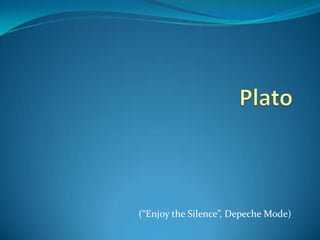
Plato
- 1. (“Enjoy the Silence”, Depeche Mode)
- 2. Please only use the “play” button to advance the slide show or you’ll miss animated content & movies
- 3. Glossary BCE : “Before Common Era (cf. BC) CE : “Common Era” (cf. AD) c. : circa (Latin) for “around [some date or year]” cf. : “compare” e.g. : exempli gratiā (Latin) for “for example” etc. : et cetera (Latin) for “and so forth” ≈ : “approximate” or “approximately” : “Possible” or “possibility” : “Necessary” or “necessity”
- 4. Agenda Plato Background Early Platonic Dialogues & Elenchus Socrates vs. “Socrates” vs. Plato ἔλεγχος (elengkhos, Latinized as elenchus) ἀπορία (aporia) Euthyphro – Divine Command Theory Republic I – Ethical Egoism Cf. Middle & Late Platonic Dialogues & Dialectic Cf. Rep. VII (539a) ≈ first ⅓ Republic II – Social Contract Theory Remainder Republic II-IV; VII-IX – Virtue Ethics
- 5. The safest general characterization of the European philosophical tradition is that it consists of a series of footnotes to Plato – Alfred North Whitehead, Process and Reality (1929) 39
- 6. Aristocles “the son of Ariston and Perictione or Petone”. a.k.a. Plato • 428/7-348/7 BCE • Native Athenian; Solon a claimed maternal ancestor • At least two brothers – Adeimantus and Glaucon – who are Socrates’ main interlocutors in the Republic. • Most famous student of Socrates
- 7. Aristocles “the son of Ariston and Perictione or Petone”. a.k.a. Plato • Sister Petone’s son, Speusippus, inheri ts leadership of Plato’s Academy • Over another, more famous student of Plato’s, Aristotle • His Academy lasted until Christian emperor Justinian closed it in 529 CE – after almost 950 years!
- 9. Socrates •c. 469 –399 BCBCE •Notoriously unhandsome •Despite contrasting his philosophy with mere sophistry, often associated with them •No friend of democracy •Primarily interested in matters ethical •Claimed a daemon guided his actions toward the right & good and away from the wrong & bad
- 10. Socrates •Delphic Oracle proclaimed that “none was wiser” than he •Socrates claimed that this was only because “I know that I know nothing” •The above – and his being a gadfly to the powerful in general – lead to his being put to death by Athens •Left no written work of his own (cf. Phaedrus 274 ff. esp. 275d) •Known primarily through his students, Xenophon & Plato, and Aristophanes’ satire The Clouds
- 11. … vs. “Socrates” Relationship between Plato & Socrates is … complex Especially between Plato and his literary characterization of Socrates In the “early dialogues” “Socrates” is both a moral and philosophical hero – nay saint – who is rarely, if ever, wrong But equally rarely does “Socrates” offers anything like his own account Instead he typically only gives negative critiques of other’s substantive positions And, thus, “Socrates” is seen as the gadfly of Athens!
- 12. Elenchus (ἔλεγχος) Philosophical methodology Starts by considering something’s essential nature “what is it?” In the Euthyphro, “it” is piety; in the Republic, justice Usually asked of experts Presume SOFA (some one form account) Proceeds by showing that the various answers fail Especially those of the purported experts) And usually fail in some interesting, illustrative way I.e., show what “it” is not Examples of what not to do, of how not to reason/argue
- 13. Aporia (ἀπορία) Elentic inquiry ends in an uncomfortable, embarrassing philosophical puzzlement and silence Experts shown to be (at least) as ignorant as Socrates Nevertheless, some kind of progress – early dialogues do clear away the philosophical underbrush Audience now in a position to do real philosophy!
- 15. Plato’s Middle “Socrates” Begins to move beyond elenchus and mere critique Gives positive, substantive philosophical views Often, via the character of “Socrates” Who’s usually still Plato’s mouthpiece But not always! Sometime interesting, substantive points arise from other characters – sometime even at the expense of Socrates!
- 16. Middle Dialogues So, we must be more sensitive to what is going on How are the characters interacting? Is irony being employed here? Is Plato critiquing himself? His former (early) views? Or even his master’s (i.e. Socrates’) views? Bear in mind for Book I of his Republic! There, I argue that something very interesting happens between Plato’s “Thrasymachus” and his “Socrates”
- 17. Dialectical Method Plato’s Republic moves away from elenchus & towards dialectic And its presentation of positive arguments Republic I is elentic, ending in aporia But, here, aporia not an ending It is the “jumping off point” for the rest of the Republic Cf. Rep. VII (539a) Explicitly skeptical of elenchus as intellectually corruptive to young, untrained mind
- 18. Republic’s Dialectic The aporia of Republic I is transformed in ≈ the first ⅓ Republic II into a version of the Social Contract Theory And put into a “dialectic” with the Virtue Ethics of the remainder of the Republic II-IV; VII-IX
- 19. Plato’s Later Works Unfortunately, we will not study any of Plato’s late works here Character of Socrates continues to change over time Plato’s coming philosophically into his own. Socrates is now often a minor character Rhetorically no better or worse than any of the other characters (even if still revered and honored). No longer Plato’s mouthpiece
- 20. Plato’s Later Works Re-evaluation of his own earlier works Sometimes “Socrates” represents Plato’s old view “Have we gone too far in the middle works?” The answer is less than clear Like many middle dialogues, tend to be sustained, positive arguments that explore Φ topics in-depth Less back-and-forth, less considering of differing arguments or positions, cf. Republic and Phaedo E.g. Timaeus: Socrates is mainly the titular character’s audience; the Laws, where Socrates is wholly absent!
- 22. Plato, Euthyphro • Pay special attention to 9e-11e Recommended: • Rachels 4.1, 4.2, 4.4 (“Enjoy the Silence”, Depeche Mode)
